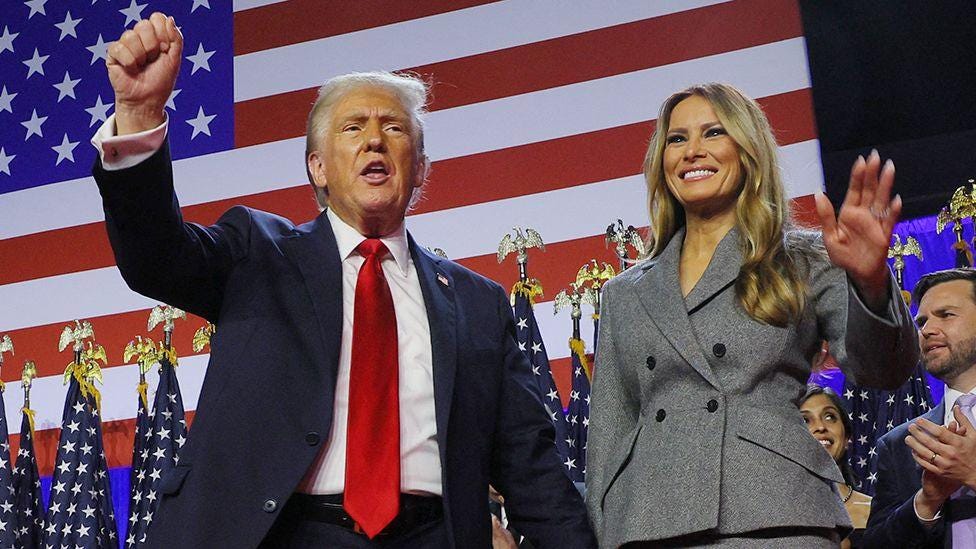Why Trump won --and what it tells us about the realignment of Western politics
A note on some brand new findings
Matt Goodwin’s newsletter goes to a community of 75,500 subscribers from 180 countries. Like our stuff? Then for the equivalent of buying us a pint each month become a paying supporter. Help us make a difference while gaining access to everything: the full archive, exclusive posts, events, discounts, comments and most of all know that you’re supporting independent writers who are challenging the broken status-quo and giving voice to the Forgotten Majority. You can also join us on YouTube, Instagram, TikTok, Twitter/X and Facebook.
The populist revolution —which this Substack called a long time ago and has tracked ever since—is continuing to upend Western democracies at speed.
From America to Germany, from Sweden to Britain, rising numbers of voters are still flocking to parties that want to end mass uncontrolled immigration, fix the borders, prioritise nation-states over global corporations, and push back against the excesses of social liberalism and radical woke progressivism.
While there are inevitably differences from one nation to the next, what national populists have in common is a hostility toward the three pillars that underpinned what writer N.S. Lyons recently described as the ‘Long Twentieth Century’:
(1) the ‘open society’, open borders orthodoxy that permeates the institutions and is most clearly expressed in the elite obsession with ‘Diversity, Equity, and Inclusion’;
(2) the rise of a managerial, unaccountable and remote bureaucracy, which hoovered up power and influence at the expense of national democracy and citizens; and
(3) a globalist ‘one-world’ interventionism that has always put the interests of a ‘liberal international world order’ ahead of the interests of nation-states and their citizens.
National populism, at its core, represents a pushback against all of this —a desire to regain the integrity and security of national borders, to reassert popular sovereignty or the power of the people against a remote elite class, and to re-establish the primacy of the national interest over an amorphous, vague and self-serving globalism.
But when it comes to making sense of this populist revolution, many people in the elite class remain completely lost. From Washington to New York, London to Berlin, the elite minority who dominate the institutions yet are also rapidly losing the trust and faith of voters, continue to cling to outdated and misleading narratives.
National populism, we are still routinely told by lost progressives, is being driven by an upsurge of ‘white nationalism’, is fuelled by 'old men’ who will soon die, is a force that will soon be replaced by much stronger left-wing movements that will benefit from rising mass immigration and ‘diversity’, and will also disappear once voters —like readers of the New York Times or the Guardian— come to realise what a threat populism poses to the institutions of democracy.
At the heart of this are two competing interpretations of the global realignment of politics that is taking place. Either you believe we are at the end of a realignment, with the likes of Trump, Le Pen, Farage, the AfD and others representing ‘one last howl’ from electoral coalitions that will soon collapse or, in sharp contrast, you believe we are only at the start of a new realignment in Western politics, with these figures and their parties representing the opening chapter.
As I’m about to show you with brand new data, I’m firmly with the latter. I believe we are only at the start of a global realignment that will now intensify in the years ahead.
To explain why, and also why so many of the established narratives are wrong, I want to show you five new findings on how and why, in America, Donald Trump was able to win such a convincing victory only a few months ago.
This victory, I think, not only reveals a lot about the future of populism in America but the future of the political realignment that is sweeping through the West.
So here, exclusively for our paying subscribers, as part of our regular exclusive posts for them, are five key takeaways from this new data about the most significant revolt to upend the West and what it means for the likes of Reform in Britain, the Alternative for Germany, National Rally in France, and others like them …
This is a reader supported publication and platform. We cannot function without your support so if you’ve not upgraded consider doing so. If you are a military veteran, emergency worker or student e-mail us direct at matt@mattgoodwin.org and ask for the discount
Keep reading with a 7-day free trial
Subscribe to Matt Goodwin to keep reading this post and get 7 days of free access to the full post archives.




